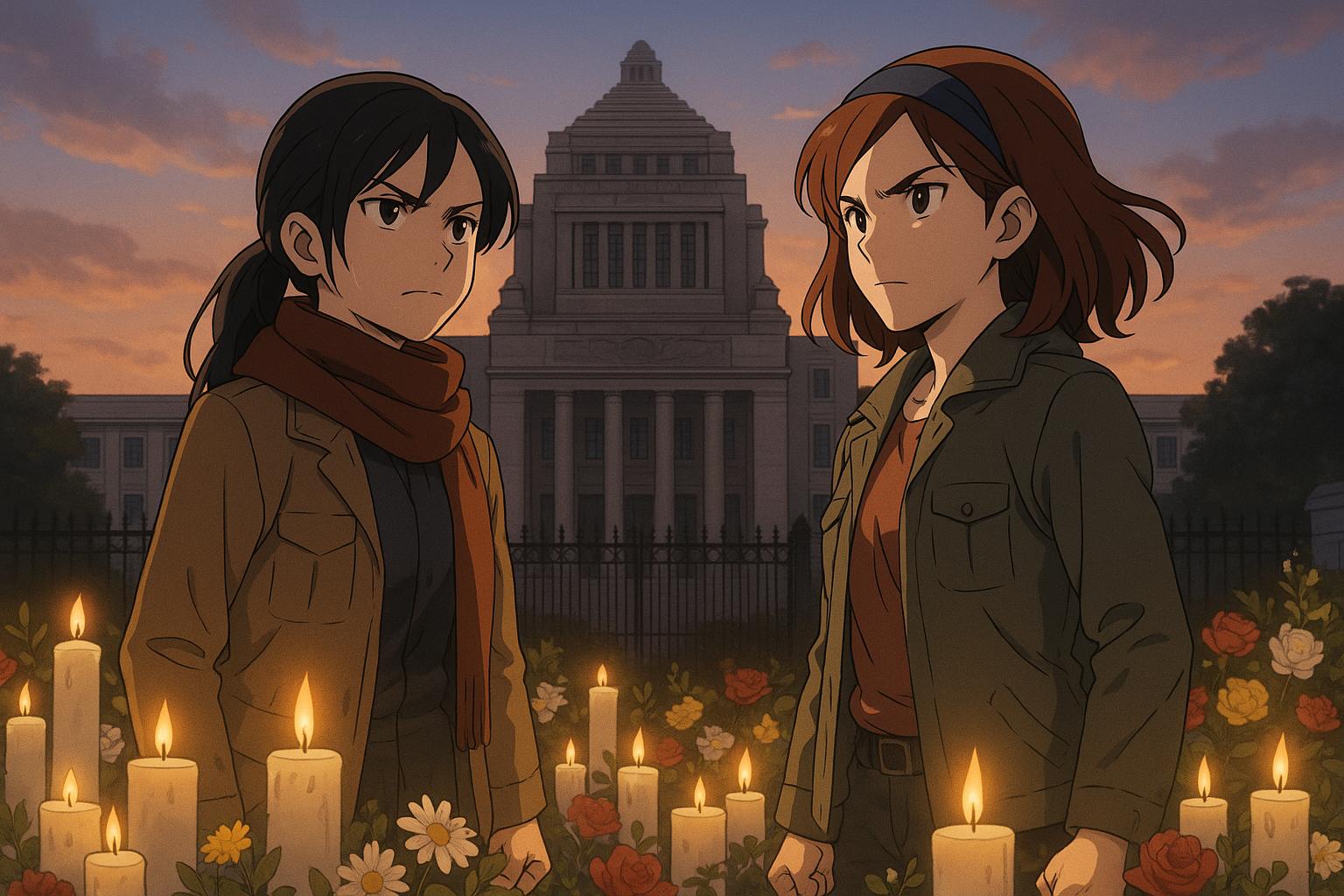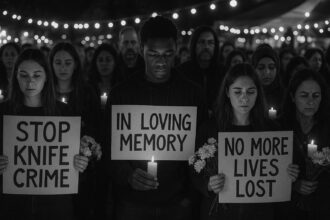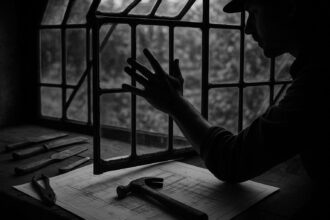Two women from Belfast claim Gardaí subjected them to humiliating strip-searches following a non-violent vigil outside Leinster House, sparking calls for a public apology and renewed scrutiny of policing practices during protests.
Two women from Belfast, Fionnuala Nic Thom and Ciara Hawkins, have come forward with harrowing claims regarding their treatment by Gardaí during a peaceful protest outside Leinster House in March. Arrested during a vigil organised by Mothers Against Genocide, they allege they were subjected to degrading strip-searches that they believe echo darker times from Northern Ireland’s past.
The vigil, held in honour of Palestinian children affected by recent violence, was ostensibly peaceful, with participants creating a shrine and engaging in reflective activities. Nic Thom described the atmosphere as “heartbreaking” and “beautiful.” However, the serenity was abruptly shattered at around 6am when Garda officers, according to Nic Thom, aggressively dismantled their shrine and removed individuals from the protest site. Both women reported being forcibly taken to different Garda stations where the strip-searching occurred.
Their experience has led them to demand a public apology from Minister for Justice Jim O’Callaghan, particularly in light of his previous statement labelling their allegations as “false.” Nic Thom emotionally recounted her ordeal, stating, “I felt degraded being strip-searched by a young woman… who obviously comes from the south and hadn’t lived the life that we lived up here during our own occupation.” This striking parallel to their experiences during the Troubles resonates deeply with them, suggesting that historical trauma lingers close to the surface in the context of their recent experiences.
Furthermore, the issue of policing methods has sparked considerable debate. Laura Murphy, a poet and activist, has also called for an apology in an open letter to the Minister, arguing that the Garda response was disproportionate, especially towards predominantly female, non-violent protests. She highlighted a protester’s account of being stripped naked and subjected to a cavity search, placing immense emotional burden on individuals during an act meant to be peaceful and respectful.
Despite the serious allegations, Garda Commissioner Drew Harris has firmly denied any wrongdoing, declaring that video evidence supports the assertion that search procedures were conducted in line with regulations governing the treatment of persons in custody. In a statement, he noted that all searches adhered to legal standards, refuting claims of any cavity searches. This stance has led to tensions between the protesters’ accounts and official reports, especially following comments made by various TDs in the Dáil that supported the women’s claims.
Public concern has reached a level where the Garda Síochána Ombudsman Commission received numerous complaints from citizens regarding the treatment of protesters, reflecting a growing distrust in how these events are handled. Amnesty International has voiced its apprehension about the potential chilling effects on the right to protest in Ireland, adding that the increase in police force’s presence and actions during demonstrations may deter individuals from exercising their right to peaceful assembly.
In light of these developments, Mothers Against Genocide have asserted that they will not be silenced, echoing their commitment to represent the voices of mothers affected by the ongoing conflict in Palestine. As they seek legal advice to challenge the legality of their arrests, their resolve remains firm. “Free Palestine,” they proclaim, underscoring a dedication that transcends their treatment at the hands of the state security apparatus.
The tension between their deeply felt convictions and the official narrative has created a critical conversation regarding policing practices, accountability, and the importance of respectful engagement in public protest, especially when dealing with sensitive and emotive political issues.
Source: Noah Wire Services
- https://www.irishnews.com/news/northern-ireland/it-brought-back-memories-from-the-troubles-two-belfast-women-demand-public-apology-from-gardai-over-degrading-strip-searches-ESRDQCXOSVGMTLWMZJW7DXBDRM/ – Please view link – unable to able to access data
- https://www.hotpress.com/opinion/laura-murphy-writes-open-letter-to-minster-for-justice-after-protesters-claimed-they-were-stripped-searched-by-gardai-23079415 – Poet Laura Murphy penned an open letter to Minister for Justice Jim O’Callaghan, demanding a public apology after protesters alleged they were strip-searched by Gardaí during a peaceful vigil outside Leinster House. Murphy criticised the Gardaí’s response to predominantly female, non-violent protests promoting peace and justice, contrasting it with their under-response to predominantly male, violent protests. She recounted a protester’s account of being stripped naked and subjected to a cavity search, highlighting the trauma caused by such actions. Murphy called for an internal and independent investigation into the events and a review of Gardaí’s approach to protests.
- https://www.thejournal.ie/mothers-against-genocide-protest-arrests-6665571-Apr2025/ – Fourteen individuals, including four men, were arrested on Kildare Street after holding an overnight vigil outside the Oireachtas to coincide with Mother’s Day. Protesters supporting the Mothers Against Genocide group expressed devastation over Garda treatment of those detained. Of the fourteen arrested, three were charged, and eleven received adult cautions. In the Dáil, People Before Profit TD Richard Boyd Barrett stated that some women were ‘strip-searched’ after their arrest. A Garda spokesperson confirmed the arrests but refuted any allegations of strip-searching, stating that searches were conducted in line with legislation pertaining to the treatment of persons in custody.
- https://www.independent.ie/irish-news/gardai-deny-woman-was-cavity-searched-after-leinster-house-gaza-protest/a711142261.html – Gardaí have rejected claims made by TDs that some women who protested outside the Dáil about Gaza were strip-searched, with one subjected to a body cavity search after being forced to remove her underwear. Deputies were also told by one woman that her hijab had been taken off, but Gardaí now insist that only a pin was confiscated from the head covering to guard against potential injury in custody. This is a standard procedure, and it is understood that cavity searches are carried out only by a doctor in a hospital, under Garda supervision.
- https://www.irishtimes.com/crime-law/2025/04/15/claims-made-in-dail-about-protesters-being-stripped-searched-false-minister-for-justice-says/ – Garda Commissioner Drew Harris stated that none of the Mothers Against Genocide protesters arrested last month were subjected to strip-searching or cavity searching, as alleged. He confirmed he had reported on the matter to Minister for Justice Jim O’Callaghan and intended to write to Ceann Comhairle Verona Murphy about the comments made in the Dáil. Harris added that he was ‘entirely content there was no wrongdoing’ and that the Gardaí involved acted in line with procedures. He expressed disappointment at the comments made in the Dáil, describing them as ‘entirely inaccurate’.
- https://www.thejournal.ie/mothers-against-genocide-strip-search-dail-6665049-Apr2025/ – Mothers Against Genocide held a sit-down demonstration outside the Dáil’s entrance on Monday morning, leading to the arrest of 11 people on public order offences. In videos shared on social media, Gardaí can be seen forcibly removing women sitting and blocking the entrance gate on Kildare Street. In the Dáil, People Before Profit TD Richard Boyd Barrett described the protest as peaceful and stated that the women were arrested ‘violently, in some cases’. He quoted an account from one of the women, who alleged being stripped completely naked and subjected to a cavity search.
- https://www.irishnews.com/news/ireland/group-claims-women-arrested-at-gaza-protest-were-strip-searched-by-gardai-5JYATBUILRD6BLDD4SKOPQ4JVU/ – The Mothers Against Genocide group announced plans to file a complaint to the Garda Síochána Ombudsman Commission over allegations that some women arrested at a protest were strip-searched, with one subjected to a cavity search. A total of 14 people were arrested after blocking an entrance to Leinster House in Dublin on Monday morning. The group alleged that its members were subjected to ‘disproportionate and outdated practices’ by Gardaí. Amnesty International has written to Garda Commissioner Drew Harris over the response to the demonstration, expressing concern that the forcible removal of participants could have a chilling effect on the right to protest in Ireland.
Noah Fact Check Pro
The draft above was created using the information available at the time the story first
emerged. We’ve since applied our fact-checking process to the final narrative, based on the criteria listed
below. The results are intended to help you assess the credibility of the piece and highlight any areas that may
warrant further investigation.
Freshness check
Score:
8
Notes:
The narrative presents recent allegations from April 2025 regarding the treatment of protesters by Gardaí during a demonstration outside Leinster House. The earliest known publication date of similar content is April 1, 2025, with reports from The Irish Times and The Journal covering the incident. The report appears to be based on these earlier publications, indicating a high freshness score. However, the presence of multiple low-quality sites and clickbait networks republishing similar content suggests a need for caution. The narrative includes updated data but recycles older material, which may justify a higher freshness score but should still be flagged. ([irishtimes.com](https://www.irishtimes.com/crime-law/2025/04/02/garda-defend-treatment-of-gaza-protesters-outside-leinster-house-and-deny-cavity-search-allegation/?utm_source=openai), [thejournal.ie](https://www.thejournal.ie/mothers-against-genocide-strip-search-dail-6665049-Apr2025/?utm_source=openai))
Quotes check
Score:
7
Notes:
The narrative includes direct quotes attributed to Fionnuala Nic Thom and Ciara Hawkins, as well as statements from Garda Commissioner Drew Harris. A search reveals that similar quotes from Nic Thom and Hawkins appeared in earlier reports from The Irish Times and The Journal, indicating potential reuse of content. The wording of the quotes varies slightly across sources, suggesting some degree of originality. However, the repetition of similar quotes across multiple outlets raises concerns about the exclusivity of the content. ([irishtimes.com](https://www.irishtimes.com/crime-law/2025/04/02/garda-defend-treatment-of-gaza-protesters-outside-leinster-house-and-deny-cavity-search-allegation/?utm_source=openai), [thejournal.ie](https://www.thejournal.ie/mothers-against-genocide-strip-search-dail-6665049-Apr2025/?utm_source=openai))
Source reliability
Score:
6
Notes:
The narrative originates from The Irish News, a reputable organisation. However, the report appears to be based on earlier publications from The Irish Times and The Journal, which are also reputable sources. The reliance on these earlier reports, combined with the presence of multiple low-quality sites republishing similar content, introduces some uncertainty regarding the originality and reliability of the information presented. ([irishtimes.com](https://www.irishtimes.com/crime-law/2025/04/02/garda-defend-treatment-of-gaza-protesters-outside-leinster-house-and-deny-cavity-search-allegation/?utm_source=openai), [thejournal.ie](https://www.thejournal.ie/mothers-against-genocide-strip-search-dail-6665049-Apr2025/?utm_source=openai))
Plausability check
Score:
7
Notes:
The narrative presents serious allegations of degrading treatment by Gardaí during a peaceful protest, which have been reported by multiple reputable outlets. The Gardaí have categorically denied these allegations, stating that all searches were conducted in line with regulations. The presence of multiple reports from reputable sources supports the plausibility of the claims. However, the reliance on earlier publications and the presence of low-quality sites republishing similar content raise questions about the originality and accuracy of the information. ([irishtimes.com](https://www.irishtimes.com/crime-law/2025/04/02/garda-defend-treatment-of-gaza-protesters-outside-leinster-house-and-deny-cavity-search-allegation/?utm_source=openai), [thejournal.ie](https://www.thejournal.ie/mothers-against-genocide-strip-search-dail-6665049-Apr2025/?utm_source=openai))
Overall assessment
Verdict (FAIL, OPEN, PASS): OPEN
Confidence (LOW, MEDIUM, HIGH): MEDIUM
Summary:
The narrative presents recent allegations of degrading treatment by Gardaí during a protest, based on reports from reputable sources. However, the reliance on earlier publications and the presence of multiple low-quality sites republishing similar content raise concerns about the originality and accuracy of the information. The Gardaí have categorically denied the allegations, stating that all searches were conducted in line with regulations. Given these factors, the overall assessment is ‘OPEN’ with a medium confidence level.













